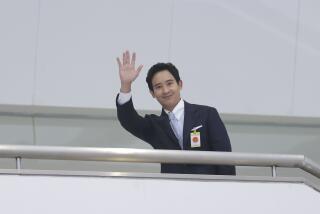Thai Government Toppled by Corruption Scandal : Asia: Coalition partner withdraws support, citing reasons of ‘political righteousness.’ Elections are called for July.
- Share via
MANILA — Thailand’s longest-serving elected prime minister, who was swept to power after a popular revolt against military rule in 1992, dissolved Parliament and called new elections Friday after his government was brought down by a corruption scandal.
Prime Minister Chuan Leekpai set July 2 for new elections.
“The best way is to return power to the people and let them consider what is best,” he said.
Chuan, who heads Thailand’s Democratic Party, governed with the support of four other parties in a coalition government. He was forced to resign when one of his coalition partners, the devoutly Buddhist Palang Dharma party, withdrew its support.
“Disagreements among various political parties in the coalition have resulted in disunity, which has prevented the government from carrying out its work,” Radio Thailand said. It added that these problems “could undermine democracy,” so it was considered best to dissolve Parliament.
Palang Dharma leader Chamlong Srimuang, a former army general known for an austere lifestyle and personal integrity, announced that his party was withdrawing its support for the government for reasons of “political righteousness” after a two-day debate over the handling of a land reform scandal.
The scandal broke last year, when Suthep Theuksuban, a senior Democratic Party official and deputy minister of agriculture, was forced to resign when it was revealed that he had given land earmarked for poor farmers to rich friends.
Although corruption is widespread in Thailand, Chuan’s party was widely regarded as one of the cleanest in the country when elections were held in September, 1992. His opposition includes at least five people named by the U.S. Drug Enforcement Administration as major drug dealers.
Chuan’s government has been widely criticized for its lack of significant accomplishments in a country burdened by increasing social problems, such as traffic, pollution and a growing gap between rich and poor.
*
What set Chuan apart was his determination to keep an elected civilian government in power in a country best known for military coups and swiftly shifting political alliances that led to instability. He lasted 2 1/2 years of a four-year term. Thailand’s last civilian prime minister, Chatchai Choonhavan, was ousted by a military coup in 1991.
While in the past the collapse of a government could have easily ushered in a period of military rule, Thailand’s military on Friday repeated assurances that it has no intent of getting involved in politics.
“The Royal Thai army strictly adheres to the policy laid down by the commander in chief that we will not get involved in the political arena,” an army spokesman said.
The watershed for the country came in May, 1992, when pro-democracy demonstrations led by Chamlong were crushed by the army and at least 50 people were killed. Demonstrators were protesting the selection of Gen. Suchinda Kraprayoon, a former coup leader, to serve as an un-elected prime minister.
The balance of power in Thailand had been changed by the emergence of a politically sophisticated middle class, outraged at the sight of Thai soldiers firing into groups of young, unarmed demonstrators.
The country has emerged as one of Asia’s most robust democracies, with a free press, freewheeling debate and a booming economy. In a measure of the nation’s newfound political maturity, the stock market barely quivered Friday with the announcement of Chuan’s downfall.
More to Read
Sign up for Essential California
The most important California stories and recommendations in your inbox every morning.
You may occasionally receive promotional content from the Los Angeles Times.










